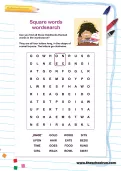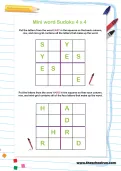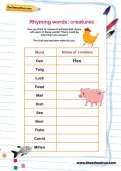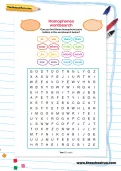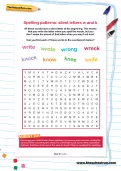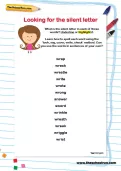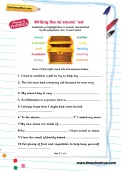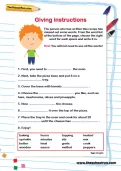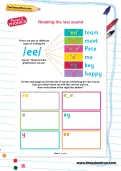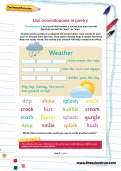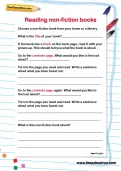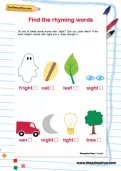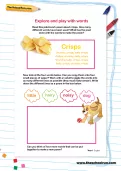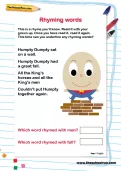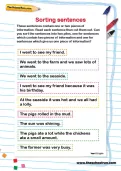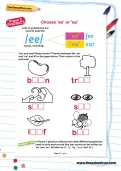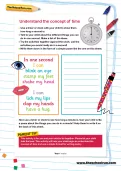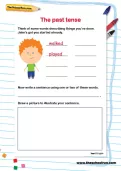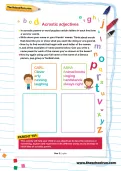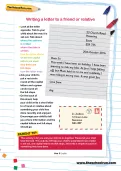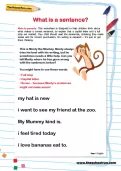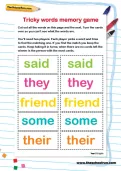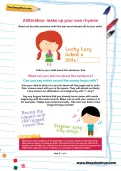Help your child learn tricky spelling words with this worksheet. Can they use the words in sentences of their own afterwards?
or
Register to add to your saved resources
Already a subscriber? to view this content.
Use this worksheet to help your child recognise the grapheme 'ea', representing the /e/ sound, and then use those words in the sentences provided.
or
Register to add to your saved resources
Help your child understand how instructions are ordered by having them fill in the blanks on this worksheet to complete the recipe.
or
Register to add to your saved resources
This activity will enable your child to recognise the /ea/ sound, which can be represented by a number of different graphemes, and practise reading and writing it.
or
Register to add to your saved resources
This fun with phonics activity will help your child to make patterns of sounds to create effects.
or
Register to add to your saved resources
This worksheet encourages children to look at the shape of words to help them with their spelling.
or
Register to add to your saved resources
Already a subscriber? to view this content.
Encourage your child to take out a non-fiction book from the library. These questions will prompt them to look for and use the features of the book, such as blurb and contents.
or
Register to add to your saved resources
Already a subscriber? to view this content.
Can you find all the words that rhyme with 'right'? An excellent activity to help your child practise listening carefully to see if a word rhymes.
or
Register to add to your saved resources
Already a subscriber? to view this content.
This Key Stage 1 reading and writing activity will help your child to explore and play with words and use an easy format for writing fun poetry.
or
Register to add to your saved resources
Encourage your child to read this poem out loud and then look for the rhyming words.
or
Register to add to your saved resources
Encourage your child to think about how sentences are structured, by getting them to sort these sentences into those with one piece of information and those with two pieces of information.
or
Register to add to your saved resources
Already a subscriber? to view this content.
Sometimes the same sound can be written in different ways. This sheet enables children to choose when to use the grapheme 'ee' and when to use the grapheme 'ea' to represent the sound /ee/, as part of a colouring activity
or
Register to add to your saved resources
Already a subscriber? to view this content.
This worksheet activity will help your child to understand how long a second and a minute are and use their knowledge to write simple poetry.
or
Register to add to your saved resources
Already a subscriber? to view this content.
This worksheet consists of singular and plural names of animals that children need to match up.
or
Register to add to your saved resources
Already a subscriber? to view this content.
Encourage your child to think of past tense verbs and then use them in sentences.
or
Register to add to your saved resources
Already a subscriber? to view this content.
This poetry worksheet encourages your child to experiment with adjectives used to describe someone in order to write an acrostic poem / puzzle.
or
Register to add to your saved resources
Already a subscriber? to view this content.
This grammar worksheet will help your child to practise writing simple letters linked to a personal experience.
or
Register to add to your saved resources
Already a subscriber? to view this content.
This worksheet gives sentences that need correcting with regards to word order or punctuation.
or
Register to add to your saved resources
Use this memory game to help your child to remember the spellings of some tricky high frequency words.
or
Register to add to your saved resources
Already a subscriber? to view this content.
This worksheet covers work from the KS1 English curriculum and will help your child to understand and use alliteration.
or
Register to add to your saved resources
Already a subscriber? to view this content.
